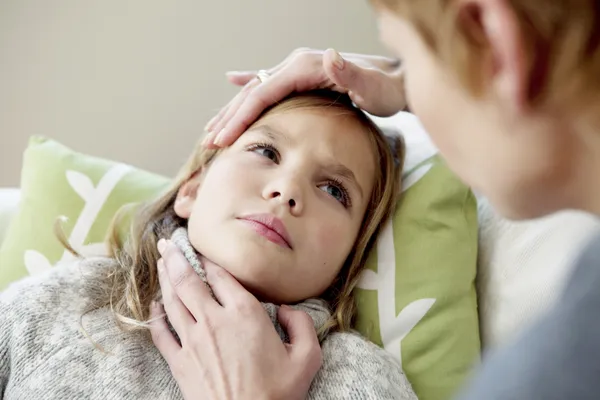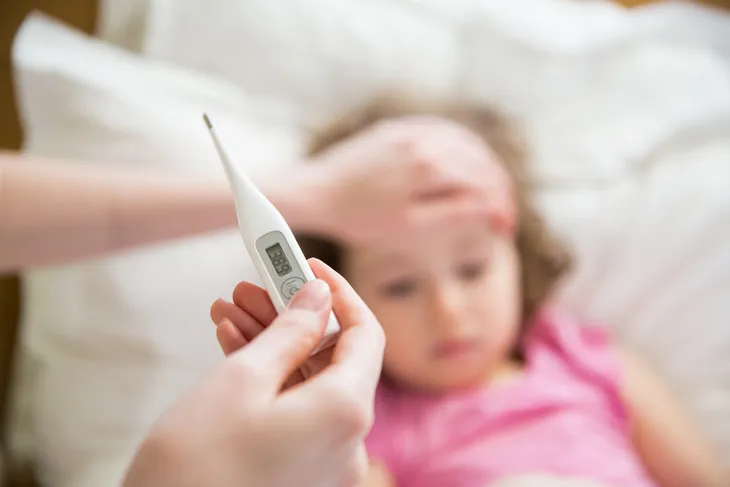Strep throat accounts for approximately 15-percent of all sore throats that present to doctors’ offices and urgent care clinics in North America. This widespread bacterial infection mostly afflicts school-aged children, but adults aren’t exempt from the red, swollen, painful throat condition. Strep throat is caused by an overgrowth of group A streptococcus bacteria, which is where it gets its namesake.
If you’re feeling under the weather, you may have strep throat if you’re experiencing these 11 warning signs…
1. Sore Throat
According to the U.S. Centers for Disease Control and Prevention (CDC), strep throat is a prevalent type of sore throat that strikes mostly children. It’s less common in adults. The painful, sore, red, and inflamed throat tissues that come with strep throat are due to a severe bacterial infection. The causes of a sore throat vary (i.e., allergies or viral, fungal, or bacterial factors as well as) environmental irritants (such as pollution or cigarette smoke), and non-bacterial causes of sore throat can mimic the uncomfortable, scratchy, and raw feeling associated with strep throat.
Luckily, if your doctor suspects strep throat, a quick throat swab can determine if group A streptococcus bacteria (or “group A strep”) is present. If it is, your physician may prescribe antibiotics to ease the pain of red, inflamed throat tissues and help encourage healing of the intense bacterial infection before it transforms into a more severe condition, such as tonsillitis or sinusitis.
2. Swollen Glands
If you think you may have strep throat, feel for swollen lymph nodes in the neck. Inflamed tonsils also commonly cause painful swallowing. However, your doctor can’t determine strep throat without a medical test or throat swab that will detect the presence of group A strep bacteria. This bacteria often lives in our throats and noses without causing illness. However, an excess of bacteria will cause it to overload the system and cause strep throat.
Strep throat is most commonly spread if you make direct contact with an infected person, or more precisely, if you come into contact with fluids (most typically droplets left after a cough or sneeze). This is why washing your hands frequently during flu season is important to prevent you from touching infected droplets and then making contact with you own mouth, nose, or eyes, leading to strep infection.
3. Fever and Chills
A mild to high fever of 100-degrees Fahrenheit that is accompanied by chills and night sweats, which rapidly decrease essential body fluids, is typical with strep throat as you fight the infection. Fever can increase fluid requirements, so be sure you are drinking enough fluids to replenish those lost to prevent dehydration.
If a high fever is present accompanied by multiple other strep symptoms, a strep test can determine your illness and dictate the need for prescription antibiotics. Obviously, strep throat is highly contagious, and those infected should take all precautions to prevent the further spread of illness by remaining home from work, school, daycare, and other social obligations until they have taken antibiotics for at least 24 to 48-hours (or according to your doctors instructions) and begin to feel better.
4. Skin Rash
Sometimes, strep throat, particularly in small children or elderly patients with weak immune systems, can cause a skin rash. This rash results from an allergic reaction to the strep bacteria in your body as well as to fever. This rash of tiny red bumps can crop up on the torso, chest, back, and neck, and you may also find little red spots (referred to by doctors as petechiae) on the area at the back and on the roof of the soft and hard palate in the mouth. Some strains of group A strep can also lead to a fever-like rash (similar to scarlet fever). The sandpaper like rash will crop up first on the chest and neck before it spreads to the torso and over the entire body.
Prescription antibiotics may be prescribed once group A strep bacteria are detected (with a medical test). It’s important that you take your prescription thoroughly and completely while following the full directions of your doctor. Prescription medication is used to reduce symptom discomfort, speed the rate of healing, prevent further spread of strep infection to others, and to reduce more serious complications (i.e., sinus infection, acute rheumatic fever, and tonsillitis).
5. Difficulty Swallowing
Strep throat will often result in painful swallowing, making it hard to drink and take in adequate fluids to fight off the infection. Try gentle fluids, such as warm soup broth and herbal teas with honey, which contain salt and sugar, to help the body with fluid replenishment. You may not feel like eating much while battling strep throat, which is understandable due to the raw, irritated, and inflamed tissues in the throat. However, it’s important to stay adequately hydrated and nourished in order to boost your immune strength and fight the illness.
Also, while you heal, be sure to wash your hands regularly as a way to keep from further spreading strep throat to those in your household. While you are sick and even when you are taking prescription medication, don’t share cups, plates, or utensils and cover your mouth completely when coughing and sneezing to keep others from getting sick.
6. Headache
Headaches often result from dehydration in strep throat patients, but it can be a flu-like symptom, along with fever, that is often shrugged off as non-consequential. Fever is also common as the body fights off foreign invaders. However, if fever persists, even after you’ve been prescribed drugs to help fight the illness, see your doctor immediately.
If you have strep throat, your doctor will likely prescribe medications to help boost immunity, lessen the symptoms of strep throat, and quicken your recovery time. Be sure to follow your doctor’s orders when taking your prescription medication. For instance, follow dosage instructions closely and finish the entire prescription, even if you start feeling better and think you don’t need the antibiotic any longer. If you stop taking antibiotics early, you risk infecting others as well as reinfecting yourself.
7. Muscle Pain
As with any type of illness, such colds and influenza, sore, achy muscles and general flu-like symptoms, including neck and head pain, and stiffness of the joints are very common, particularly for those fighting off a bacterial strep infection. You may also notice that your lymph nodes, or the glands in your neck, become tender, swollen, and hot to the touch.
Penicillin or amoxicillin are two antibiotics that are often prescribed by doctors for a period of 10 days, even when symptoms totally disappear. In addition to helping your throat feel better, antibiotics will relieve muscle aches, and neck and shoulder pain. Also, sip warm liquids, such as soothing lemon tea or tea with honey to promote relaxation and a good night’s sleep as you fight off illness. If muscle pain is severe, talk to your doctor about taking over-the-counter pain medications (i.e., acetaminophen) to see if it’s safe to combine with antibiotics.
8. White Patchy Throat
We all know that raw, scratchy, irritated sensation that hits us at the back of the throat, which can innocently be the result of dry air, winter allergies, or a common cold. However, if the culprit is group A strep, a type of highly contagious bacterial infection, that sore, inflamed, raw throat will persist, and it can be dangerous if it goes untreated.
In severe cases of strep throat, you may notice that the back of the throat appears swollen and red with white patches and visible pus spots along the tonsils. Opening your mouth and saying “Ahhh” to your doctor might raise the ire of the presence of group A strep bacteria, which often leaves white patches in the back of the mouth (on the soft and hard palates) as well as on the throat and tonsils, along with red swollen tissues.
9. Nausea, Vomiting, and Loss of Appetite
In some cases, strep throat may be accompanied by nausea and vomiting. Although these aren’t particularly common symptoms, they can occur most often in children who contract the condition.
Additionally, some people with strep throat may suffer from a loss of appetite. This may be due to the undesirable discomfort of nausea, as any food they eat tends to come right back up, or as a result of their throat being swollen, which makes swallowing food incredibly challenging.
10. Bad Breath
There are many different reasons a person may have bad breath, from eating certain foods, to poor oral hygiene and throat infections (such as strep throat). Livestrong.com explains, “Because the presence of bacteria can give off an odor, a bacterial throat infection may be associated with bad breath due to increased amounts of microorganisms in the throat.”
For relief of this bad breath, also known as halitosis, doctors will often prescribe an antibiotic that the source says “will reduce the levels of bacteria in the throat,” along with treating other symptoms associated with strep throat.
11. Other Symptoms
There are a variety of other signs that can indicate a person may have strep throat. For example, they may experience body aches and weakness, similar to what would be experienced with an influenza-like illness. This may be felt in the muscles as well as the joints.
Although seemingly unrelated, people with strep throat may also suffer from abdominal pain. The reason is because the group A streptococcus bacteria may have spread from the nose and throat area into the abdomen as well as nearby organs, such as the bladder and bowels.













